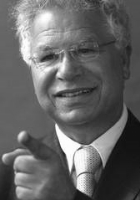Mourid Barghouti
Mourid Barghouti Poems
His finger almost touches the bell,
the door, unbelievably slowly,
opens.
He enters.
...
I look at myself:
I have no problem.
I look all right
and, to some girls,
...
With a gentle hand, the storm grasps
the handle of the door of the world;
like a hesitant stranger, it lets itself in,
...
There is a sweet music,
but its sweetness fails to console you.
This is what the days have taught you:
in every long war
...
A poet sits in a coffee shop, writing.
The old lady
thinks he is writing a letter to his mother,
...
My grandfather, still harbouring the illusion
that all is well with the world,
fills his countryside pipe
...
It's also fine to die in our beds
on a clean pillow
and among our friends.
...
Mourid Barghouti Biography
(Arabic: مريد البرغوثي, Murīd al-Barghūti) (born July 8, 1944, in Deir Ghassana, near Ramallah, on the West Bank) is a Palestinian poet and writer. Barghouti grew up in Ramallah as one of four brothers. In the mid-1960s, Barghouti went to study at Cairo University in Cairo, Egypt. He was just finishing his last year in college when the Six-Day War of 1967 started. By the end of the war, Israel had captured Gaza and the West Bank, and Barghouti, like many Palestinians living abroad, was prevented from returning to his homeland. After the war Barghouti first went to work as a teacher at the Industrial College in Kuwait. At the same time, he began to pursue his interest in literature and poetry, and his writings were soon published in the journals al-Adab, Mawaqif, in Beirut and al-Katib, "attaleea" and "Al Ahram" in Cairo. In 1968, he became acquainted with the Palestinian cartoonist Naji al-Ali, who at that time was also working in Kuwait. In 1970, Barghouti married the Egyptian novelist and academic Radwa Ashour. The two had met years earlier, when they were both students of the English Department at Cairo University. They have one child, a son, Tamim Al Barghouti, born in 1977 in Egypt, who is now a poet with four published books of poetry. The couple left Kuwait for Egypt less than a year after marrying. In 1972, Barghouti published his first book of poetry in 1972 (Dar al-Awdeh in Beirut, Lebanon). He has since published 12 books of poetry, the last of which is Muntasaf al-Lail (Midnight, Beirut, 2005, Riad El Rayes Publishers). His Collected Works came out in Beirut in 1997. A Small Sun, his first poetry book in English translation, was published by the Aldeburgh Poetry Trust in 2003. He was awarded the Palestine Award for Poetry (2000). His poems are published in Arabic and international literary magazines. English translations of his poetry have been published in Al Ahram Weekly, Banipal, The Times Literary Supplement and Modern Poetry in Translation, and one of his most famous poems appeared as a cover photo of Pen International. In the autumn of 1977, Barghouti was deported from Egypt on the eve of Anwar Sadat's controversial visit to Israel and was allowed to come back only after 17 years. Barghouti, his wife and their son had to spend most of the next 17 years apart; Radwa lived in Cairo as a professor of English at Ain Shams University, and he lived in Budapest as a PLO representative in the World Federation of Democratic Youth and a cultural attache.)
The Best Poem Of Mourid Barghouti
A Night Unlike Others
His finger almost touches the bell,
the door, unbelievably slowly,
opens.
He enters.
He goes to his bedroom.
Here they are:
his picture next to his little bed,
his schoolbag, in the dark,
awake.
He sees himself sleeping
between two dreams, two flags.
He knocks on the doors of all the rooms
- he almost knocks. But he does not.
They all wake up:
"He's back!
By God, he's back!" they shout,
but their clamour makes no sound.
They stretch their arms to hug Mohammed
but do not reach his shoulders.
He wants to ask them all
how they are doing
under the night shelling;
he cannot find his voice.
They too say things
but find no voice.
He draws nearer, they draw nearer,
he passes through them, they pass through him,
they remain shadows
and never meet.
They wanted to ask him if he'd had his supper,
if he was warm enough over there, in the earth,
if the doctors could take the bullet and the fear
out of his heart.
Was he still scared?
Had he solved the two arithmetic problems
in order not to disappoint his teacher
the following day?
Had he . . . ?
He, too, simply wanted to say:
I've come to see you
to make sure you're alright.
He said:
Dad will, as usual, forget to take his hypertension pill.
I came to remind him as I usually do.
He said:
my pillow is here, not there.
They said.
He said.
Without a voice.
The doorbell never rang,
the visitor was not in his little bed,
they had not seen him.
The following morning neighbours whispered:
it was all a delusion.
His schoolbag was here
marked by the bullet holes,
and his stained notebooks.
Those who came to give their condolences
had never left his mother.
Moreover, how could a dead child
come back, like this, to his family,
walking, calmly, under the shelling
of such a very long night?
